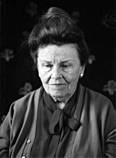Louise March

Louise March (1900-1987)
Louise March, originally, Louise Goepfert, was born in Switzerland in 1900 and spent most of her childhood in Germany. She studied art history at Berlin University, and then came to the United States in 1926 as a graduate exchange student, where she continued her studies in art history at Smith College, afterwards joining the faculty of the Art Department of Hunter College. She later became a manager at the Opportunity Gallery in Manhattan, becoming established in New York’s artistic circles.
She met Gurdjieff at a recital given at Carnegie Hall by Thomas de Hartmann. Her meeting with Gurdjieff proved to be a turning point in her life. Upon Gurdjieff’s invitation she came to France to live and study at the Institute for the Harmonious Development of Man in Fontainebleau.
Louise Goepfert worked as Gurdjieff’s secretary, and also worked on translating Gurdjieff’s writings into German and preparing them for publication. She stayed in Gurdjieff’s circle up until his death in 1949.
After the community at the Chateau de Prieuré was closed by Gurdjieff, Miss Goepfert remained in Europe. She married German architect Walter March in 1933 and settled with him in Berlin until 1936, when as a result of the political situation in Germany they moved to the United States.
In 1957 Louise March began to visit Rochester, New York, where there had emerged a group of people interested in Gurdjieff’s ideas. She began leading this group, which developed by means of applying Gurdjieff’s ideas with practical emphasis on craftmaking and physical work activities. It was subsequently called the Rochester Folk Art Guild. In 1967 a house was bought in Middlesex, New York, near Rochester, which became the Guild’s home. Many members of the group moved near this house and started to raise families. One important focus of the group was regular disciplined work in crafts and agriculture. The group members built residences, craft shops and a hall for the Movements near the Rochester Folk Art Guild, directed by Mrs. March until her death in 1987. The Guild is continuing its activities up to the present day, directed by Mrs. March’s senior pupils. It continues its unique form of combining craft work, community life and studies of Gurdjieff’s teachings.
As a teacher Mrs. March emanated great magnetism, presence and insight. She had a deep understanding of the human condition, and was able to lead many people in their spiritual development. She wrote a number of texts dealing with the Gurdjieff tradition, including her essay in German, “G. Gurdjieff: Ein Hinweis auf Sein Leben und Werk” (“G. Gurdjieff: A Guide to his Life and Work”), written by her in German in 1950, translated by the author in 1984 into English. Another important article by Mrs. March was “Introduction to the Tibetan Book of the Dead,” presenting instructions of how to read Gurdjieff’s “Beelzebub’s Tales”.
Articles:
G. Gurdjieff: A Call for Attention to his Life and Work
Louise March – G. Gurdjieff – Ein Hinweis Auf Sein Leben Und Werk
Quotations:
From Mrs. March’s “Introduction to The Tibetan Book of the Dead, containing somesuggestions as to the right reading of Beelzebub’s Tales”:
The first step is to ‘learn to listen,’ to wish to listen, to wish to drop the chaos in oneself in the same way that we drop the body at physical death. This step means that we won’t interfere any longer, will not change anything (in the beginning not even ourselves); that we will not quarrel, that we have no opinion to insist upon; that we will not translate what we hear into our automatic daily language—which would be equal to letting it go out the other ear. This step means that one stays quietly apart from the million-fold army of attacking thoughts and feelings and physical associations…
Excerpts from an essay on Gurdjieff, written by Mrs. March in 1950:
Rather at the beginning of my work with him, while I was still amazed that Gurdjieff did not look for anything which constitutes the pleasures and strivings of all other men, he placed himself one day (when he was obviously tired) next to me after he returned from the café. We were on the terrace with the beautiful view of the garden at the Prieuré, where I was working on the translation of the first series of his writings. I asked him, ‘Why don’t you also work here with the view of the roses, the goldfish pond, and the trimmed rows of Sycamores, in such good air?’ He replied, ‘I always work in cafés, dance halls, and similar places where I see people, how they are; where I see those most drunk, most abnormal. Seeing them I can produce the impulse of love in me, and from that I write my books…’
Quotes from articles about the Guild:
Developed man is beyond like or dislike. He serves such as he can with his small powers and short years on earth.
Every human being is a speck in the universe. This makes us more modest—on our knees and open to higher influences.
When one enlarges one’s inner life, one finds an artist.
The sourse: http://www.gurdjieff.org/index.en.htm





